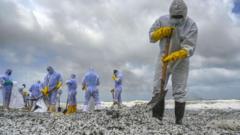In May 2021, the X-Press Pearl cargo ship sank off the coast of Sri Lanka, causing the worst plastic spill in the ocean's history. Even four years later, volunteers are still working tirelessly to clean up beaches contaminated by billions of toxic plastic pellets known as nurdles. As they sift through the sands, concerns are rising about the long-term damage inflicted on marine life and ecosystems.
The X-Press Pearl was en route from Dubai to Malaysia when a leaking container of nitric acid set off a chain of events that led to catastrophic fires, eventually causing the ship to sink. The vessel released not only nurdles but also toxic substances like engine fuel and lead into Sri Lankan waters.
Environmental scientist David Megson from Manchester Metropolitan University highlights that as the nurdles sink deeper into the sand, they absorb additional pollutants, making them increasingly toxic. This has raised alarm bells about the repercussions for local marine life, including fish that have been found contaminated with hazardous metals.
Local fishermen report a drastic decline in fish populations since the disaster, with some even resorting to selling their boats and considering emigration. The Sri Lankan government is seeking further compensation from the ship's owner, X-Press Feeders Ltd., who has already spent over $150 million on cleanup efforts while claiming the government has not adequately managed shoreside cleanup operations.
With estimates of the disaster's total cost exceeding $6 billion, experts warn that the ongoing impact could threaten not only the environment but also public health. Many locals, tired of waiting for justice, face a desperate future as the country's rich marine resources continue to be jeopardized.




















